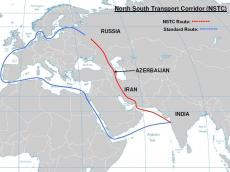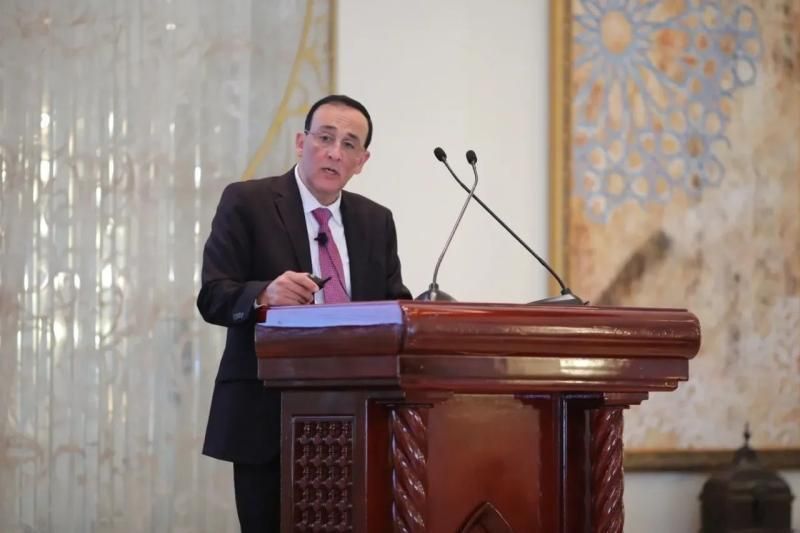|
|
TODAY.AZ / Politics
India's strategic maritime expansion: Closer look at INSTC, where Azerbaijan is significant transport hub
15 May 2024 [08:30] - TODAY.AZ
 Ulviyya Shahin
Ulviyya Shahin
India intends to sign an agreement with Iran on the management of the Chabahar port within the next ten years and connect it with the International North-South Transport Corridor (INSTC), where Azerbaijan is a significant transport hub. The Economic Times reports about this.
According to the publication, Indian Minister of Ports, Shipping, and Waterways Sarbananda Sonowal will visit Iran on Monday to sign the agreement. This is the first time that India has taken over the management of a foreign port.
The new contract will be valid for 10 years and will be automatically renewed. In the future, it is planned to connect India to the INSTC through Chabahar port.
This trade route is intended for the transportation of goods from India and the Persian Gulf countries through the territories of Iran, Azerbaijan, and Russia, as well as connecting the railways of these three countries to Western and Northern Europe.
The main advantage of the corridor is the reduction of cargo delivery time by two to three times. Chabahar port is located in the southeast of Iran. In 2003, India and Iran agreed to jointly develop the port, but the project was later shelved due to international sanctions against Iran.
During his visit to Tehran in 2016, Indian Prime Minister Narendra Modi announced his intention to invest $500 million into the construction of the port infrastructure of New Delhi.
In May 2016, India signed a tripartite agreement with Iran and Afghanistan for the construction of the Shahid Beheshti terminal at the port.
Several questions arise: What is the significance of India's intention to sign an agreement with Iran regarding the management of the Chabahar port? How does connecting the Chabahar port with the International North-South Transport Corridor (INSTC) benefit India and other countries involved? What will be the profit of Azerbaijan in this matter? Against the background of the position of India and Iran against Azerbaijan, in what direction can the situation change economically and politically?
While answering questions for Azernews, British expert Neil Watson thought that this move was extremely significant.

"It is the first move by a westward-facing country - India - to actually work with Iran, which is usually considered a pariah state. Furthermore, it signals Iranian trust in a country that has excellent relations with the US and is a significant constituent part of the BRIC nations, which are shaping the new world economy. It also indicates that Iran no longer considers Russia to be its saviour and default partner, particularly in light of its ongoing distraction with Ukraine and the ramifications of that."
According to him, the benefits to India and other countries - both regarding imports and exports - are absolutely huge.
"The INSTC has already minimised the transportation time for Chinese products and India and the other countries involved will benefit from reduced transportation time and logistical economies of scale. However, conversely, it benefits India, Persian Gulf countries, and Azerbaijan, as their products can be easily be distributed far beyond their traditional territory, even into Europe. This comes at a time when demand for hydrocarbons is changing and ultimately reducing and the need for all oil-rich countries to diversify their economies is pressing."
Watson noted that the benefit to Azerbaijan is the ability to import goods from China, India, and other countries more effectively, thereby increasing the range available in the country and ultimately reducing prices. Also, Azerbaijani goods can be exported far and wide very easily with optimised logistical costs, thereby making them competitive on the world stage.
"In my view, this signals a thaw in the challenging Azerbaijani- Iranian-Indian relationship. India and Iran have been under Soviet/Russian/Armenian influence for decades, but given Armenia’s defeat and Russian withdrawal from the South Caucasus, it is time for these countries to work together and cohesively on a business footing. This can only serve to ultimately enhance diplomatic relations," the British expert concluded.
But Dr. Frank Musmar, Executive Advisory Board President for the University of Maryland Global Campus, an advisory member at the Abrahamic Accord Business Circle, and a Board Member at Paris Metropolitan University, highlighted India's adoption of a strategy akin to China's earlier "string of pearls" by investing in strategic ports overseas.

"This strategy will enhance India's global strategic presence and maritime access. India has secured investments in ports in Iran, Sri Lanka, Myanmar, and Oman and is planning to invest in the Philippines. The Indian Minister of Ports, Shipping, and Waterways, Sarbananda Sonowal, and the Iranian Transport and Urban Development Minister, Mehrdad Bazrpash, signed the 10-year contract. The plan is to connect India to the INSTC through Chabahar port, where Azerbaijan is a significant transport hub, to reduce the cargo shipping cost and delivery time by two to three times.
The instability caused by the ongoing war in Gaza and Houthi attacks on ships transiting the Red Sea has put the projected India-Middle East-Europe Corridor (IMEC) on hold until further notice. India seems to be reassessing its position within international transport routes in this context. Attention is now turned towards an 'old acquaintance': the International North-South Transport Corridor (INSTC).
Among the ports that were projected to connect on the west coast of India are Mundra (Gujarat), Kandla (Gujarat), and Jawaharlal Nehru Port Trust (Navi Mumbai). In the Middle East, at least five ports have been shortlisted to be connected to the Indian ports, including Fujairah, Jebel Ali, and Abu Dhabi in the UAE and Dammam and Ras Al Khair ports in Saudi Arabia. "Multiple routes are being considered to reduce the freight load on one route prospectively. Accordingly, and if the situation calms down in the Middle East, India could utilise the Chabahar port to pursue the immature plan of the India-Middle East-Europe Corridor (IMEC) without needing other ports."
Dr. Frank Musmar recalled that the port of Chabahar is located on the Makran coast of Sistan and Baluchistan Province, next to the Gulf of Oman and at the mouth of the Strait of Hormuz.
"It is the only Iranian port with direct access to the Indian Ocean. Being close to Afghanistan and the Central Asian countries of Turkmenistan, Uzbekistan, and others, it has been termed the "Golden Gate" to these landlocked countries. To India, it is the perfect plan to access markets in Central Asia, Afghanistan, and Eurasia while bypassing its rival, Pakistan.
As for the other countries in the region, the INSTC will bridge different regions and pursue the intra-regional development of energy-rich countries. Its significance has grown immensely, particularly after the Ukraine war. Moscow and Iran could use the INSTC as a potentially vital economic escape route into the larger Asian region to circumvent Western sanctions prohibiting specific goods."
Dr. Musmar asserted that the modern India-Azerbaijan relationship is built on cultural and economic ties that materialised via the ancient Silk Route.
"Azerbaijan became part of INSTC in 2005, and its well-developed railways and a strategic seaport in Baku paved the way for the Western Route of INSTC that runs west of the Caspian Sea. The Western Route links the Iranian ports of Chabahar and Bandar Abbas in the Arabian Sea to the vast railway networks in Eurasia, especially with the Baku-Tbilisi-Batumi or the Baku-Tbilisi-Kars transnational rail connections constructed under the Trans-Caspian International Transport Route, which makes the Western Corridor of INSTC via Azerbaijan the most critical strategic part of the entire project for India."
"India recognised Azerbaijan's independence in 1991, and India's bilateral trade with Azerbaijan has been growing steadily in recent years. As for Iran, Iran and Azerbaijan will defuse the tensions and change rhetoric. The construction of a cargo terminal in Astara, on the Caspian Sea next to the Azeri border, by the end of 2024 and the latest development in the INSTC will help bridge the disagreements. The prize is clear: an opportunity to put aside their differences and tone down tensions to reap geo-economic dividends," Dr. Musmar added.
URL: http://www.today.az/news/politics/248334.html
 Print version
Print version
Connect with us. Get latest news and updates.
See Also
- 17 April 2025 [15:00]
Azerbaijan, Slovenia forge new business ties with preliminary deals - 17 April 2025 [14:14]
A fat, nosy and bald hint that Armenia will remove claims against Azerbaijan from the Constitution - 17 April 2025 [12:32]
Azerbaijani, Slovenian foreign ministers meet in Baku to boost political dialogue - 17 April 2025 [10:00]
Azerbaijan, Iran hold bilateral consular consultations in Tehran - 16 April 2025 [18:40]
Azerbaijan and Uzbekistan enhance media cooperation - 16 April 2025 [15:32]
UN-Habitat Executive Director visits Azerbaijani embassy in Kenya - 16 April 2025 [14:41]
Azerbaijani and Georgian Presidents hold expanded meeting over luncheon - 16 April 2025 [13:18]
President Kavelashvili: Georgia always supported Azerbaijan's territorial integrity and sovereignty - 16 April 2025 [12:42]
Joint projects between Georgia, Azerbaijan hold significance for broader region: President - 16 April 2025 [12:12]
The "parallel" worlds of Armenia
Most Popular
 Azerbaijan discusses co-op & regional stability with Syrian Transitional Government
Azerbaijan discusses co-op & regional stability with Syrian Transitional Government
 The "parallel" worlds of Armenia
The "parallel" worlds of Armenia
 Antalya Diplomacy Forum becomes center of global dialogue
Antalya Diplomacy Forum becomes center of global dialogue
 China bans its airlines from purchasing Boeing aircraft
China bans its airlines from purchasing Boeing aircraft
 Accused French spy Martin Ryan claims his ties were ‘personal’
Accused French spy Martin Ryan claims his ties were ‘personal’
 Kazakhstan starts supplying uranium to Czech Republic
Kazakhstan starts supplying uranium to Czech Republic
 It would be interesting to listen to Mirzoyan's curators in Europe
It would be interesting to listen to Mirzoyan's curators in Europe
